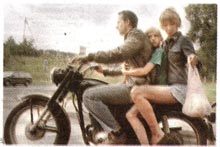 Libération
05.11. 2008
Libération
05.11. 2008

"Tricks"
And what if the 7th art still existed? What if the saying "I love life, I go to the cinema" did not insult common sense this one time... This is the kind of reflection that Tricks leaves behind. This is a movie you just have to go back to, so much it differentiates itself from the dirt of our times, the brutality and the incredible stupidity of most movies; it graciously makes up for all the mercantile cynicism that we are used to.
Nothing from this can be found in this feu follet (will-o'-the-wisp), that places itself as the missing link between The Italian, a movie about a russian orphanage (sic) not even noticed in 2007, and the The Band's Visit dealing with purification and moral standards. Time is suspended, even the season, in the world of Tricks; just as if both our "cruel spirit and impure laughter" were giving us a break. Life is suddenly beautiful because of next to nothing: a dovecote, disheveled by the signal, a micheline train, two streets in a no man's land of a faceless provincial city in the surroundings of Walbrzych, a motorcycle ride facing the wind like rowdies, a scrap-heap, a grocery store, a serene mother, a bar with dancing on the corner, a Luncheon on the Grass with a strumpet and a leech, a transformed A Midsummer Night's Dream farniente, eating and gently drinking, peeing, strolling round the town... |
 The biker, the elfin hero and his beautiful sister.
Of these little things the movie makes a whole universe and everything is in it. The hole is an Olympus, a gallery of unknown people
becomes heroic humanity - so dreamily sacred that it seems strange to live without them once the movie ends. Without melodrama or cuts, or babbling, in an arpeggio of mandorlas, this universe is simply seen from a child's perspective. Numerology and animism are reigning; two lead soldiers distort the space-time continuum of this evasive cosmos, where a propitiatory invocation controls the obscure yet harmonious order of things. The child "merchant of wings" of this story is more of a Carrot hair"" than The 400 Blows, more Petit Gibus than Kes, placid and sibylline, a divine child in the end. Does he not have the power of creating by clenching his fists? The power to give himself a name, that is: a father... This angel's visitation to the village, portrayed by the noble Damian Ul, has a sister. Of a rather skinny beauty (in our opinion), which is perfect for the part: Ewelina Walendziak, a young pearl ready to relegate Scarlett Johansson into the background. Between flirting and work, she partners the little boy flawlessly, following the same cabalistic martingales. She is a fairy of her own; between those two life is a delight. So much in fact that one can see oneself in the middle of the cinema after the screening, totally amazed. The apprehensive reader that whistles amiration at this conclusion should be proud of himself.
|
translated by Justine Julie Charlet
footnotes:
The Italian (Italianetz, Итальянец, directed by Andrei Kravchuk, 2005)
The Band's Visit (Bikur Ha-Tizmoret, ביקור התזמורת directed by Eran Kolirin, 2007)
Luncheon on the Grass (Le déjeuner sur l'herbe, by Édouard Manet)
A Midsummer Night's Dream ( byWilliam Shakespeare)
Merchant of wings (Le marchand d'ailes, by Jacques Taravant)
Carrot hair"" (Poil de Carotte, by Pierre-Jules Renard)
The 400 Blows (Les Quatre Cents Coups, directed by François Truffaut, 1959)
Petit Gibus (may be from: La Guerre des boutons, War of the Buttons directed by Yves Robert, 1962)
Kes (directed by Ken Loach, 1969)
footnotes:
The Italian (Italianetz, Итальянец, directed by Andrei Kravchuk, 2005)
The Band's Visit (Bikur Ha-Tizmoret, ביקור התזמורת directed by Eran Kolirin, 2007)
Luncheon on the Grass (Le déjeuner sur l'herbe, by Édouard Manet)
A Midsummer Night's Dream ( byWilliam Shakespeare)
Merchant of wings (Le marchand d'ailes, by Jacques Taravant)
Carrot hair"" (Poil de Carotte, by Pierre-Jules Renard)
The 400 Blows (Les Quatre Cents Coups, directed by François Truffaut, 1959)
Petit Gibus (may be from: La Guerre des boutons, War of the Buttons directed by Yves Robert, 1962)
Kes (directed by Ken Loach, 1969)